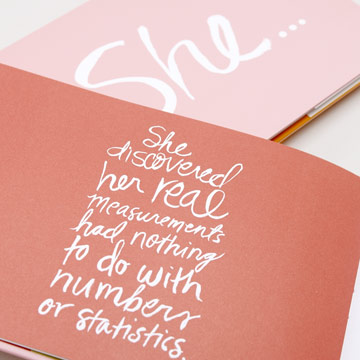if only i’d known: beauty is a state of mind
A couple of months ago I attended a panel discussion on Women in Film as part of the Arab Film Festival in Sydney. The chair for the session, Paula Abood, opened the discussion with a quote from Ways of Seeing (Berger, 1972):
A woman must continually watch herself. She is almost continually accompanied by her own image of herself. Whilst she is walking across a room or whilst she is weeping at the death of her father, she can scarcely avoid envisaging herself walking or weeping. From earliest childhood she has been taught and persuaded to survey herself continually. And so she comes to consider the surveyor and the surveyed within her as the two constituent yet always distinct elements of her identity as a woman. She has to survey everything she is and everything she does because how she appears to men is of crucial importance for what is normally thought of as the success of her life. Her own sense of being in herself is supplanted by a sense of being appreciated as herself by another.
This paragraph resonated with me, not least because I saw my very sense of self reflected in those words. From the moment we’re conceived we’re saturated with images of the women we ought to be – conventionally feminine, effortlessly youthful and timelessly desirable. Our lives become a performance for an enigmatic he who (if we do it right) will express his approval through a declaration of love. We quickly learn that the fastest way to gain his approval is by being physically attractive.
If we get it wrong, however – and the market for self-help books on relationships, suggests most of us seem to – we’re banished to life as an eternal spinster, either with 12 cats and a studio apartment we can’t afford or a luxury penthouse, an attitude that bites and a heart of steel. Regardless, life without male approval is social suicide; even worse, life without male approval is a testament to our less than average exteriors.
Unfortunately, and in particular when we’re younger, beauty is stock standard. In fact what we associate beauty with is femininity. By saying ‘you look beautiful’ what we actually mean is ‘you look feminine’ and anything that strays from typically feminine goes unrewarded. The result of which is to prioritise physical beauty over personality and intellect.
By the time we reach adolescence we’re well aware of the strong link between our bodies and our sexuality, and as mass consumers of media we can surely be forgiven for believing our sole purpose as women is to satisfy a male gaze. With every turn of the page a younger, skinnier, shinier model rekindles our every insecurity; with every glance at her photoshopped physique a fire of doubt is reignited, illuminating flaws we’d never previously considered. We go so far to dismiss compliments from our girlfriends when they attest to our outward beauty, believing it amounts to more when it comes from him, even when he is nothing more than a figment of our imagination.
Well into our twenties the cycle continues, however the implications are greater. Women begin to spend money they don’t have on cosmetic surgery they don’t need to impress men they still don’t know. And when a relationship falls apart we wonder if it would have survived if only we’d been prettier. He might have maintained interest if only we’d have been more attractive.
We allow our self worth to be contained in our external beauty measured by the number of compliments we receive, the calibre of men who look us up and down and whether or not we’re in a long-term relationship.
Even by resisting dominant ideas of beauty, whether through celebrating our wide hips or wild curls we still give priority to the physical over and above the intellectual. We’re still accepting archaic ideas about women being seen and not heard. We’re saying ‘I may not be conventionally beautiful but someone somewhere might find some reason to, if they look hard enough.’ And so we continue to equate beauty with love.
Standards of beauty are not created or maintained in a vacuum; they’re internalised at an early age through rewarding particular behaviours. Rewards need not be tangible but rather can be as simple as being told how “beautiful” we look or being given extra attention. While we might think of Western standards of beauty as being tied up with ideas of the male gaze we must remember that women make up 51% of the population, meaning we are equally complicit in perpetuating this cycle of insecurity which does nothing but devalue us. We judge other women for their appearance, their fashion choices, their hairdos and we reduce one another to the sum total of our latest designer products and unnecessary cosmetic surgeries.
If as women we truly want to be valued for our minds, ideas and our contributions to society, then it’s imperative we demand this through our actions and our words. But we can only begin to demand it if we truly believe this is where our worth lies. As women, we should stop obsessing about the way we look for the sake of our own self worth, and for the worth of the little women around us.
By Mehal Krayem


